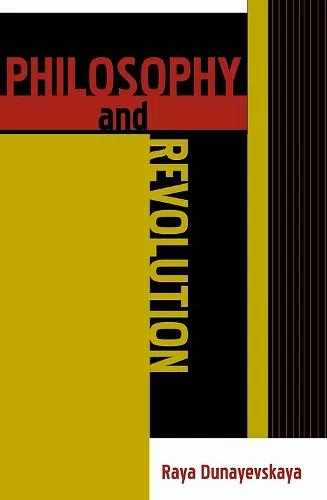Philosophy and Revolution
From Hegel to Sartre, and from Marx to Mao
Format:Paperback
Publisher:Lexington Books
Published:22nd Feb '03
Currently unavailable, and unfortunately no date known when it will be back

Few thought systems have been as distorted and sometimes misconstrued as those of Marx and Hegel. Philosophy and Revolution, presented here in a new edition, attempts to save Marx from interpretations which restrict the revolutionary significance of the philosophy behind his theory. Developing her breakthrough on Hegel's Absolute Idea, Raya Dunayevskaya, who died in the June of 1987, aims at a total liberation of the human person—not only from the ills of a capitalist society, but also from the equally oppressive state capitalism of established communist governments. She assumes within her theory of class struggle issues as diverse as feminism, black liberation, and even the new nationalism of third world countries. Moreover, Dunayevskaya combines within herself an incorruptible objectivity with a passionate political attitude, making this work a vibrant and concrete discussion of the vicissitudes of society, justice, equality, and existence.
Lukacs and Korsch had proposed a similar, Hegelian reading. Yet a notable difference separates Dunayevskaya from these earlier positions. Their interpretation had limited the revolutionary impact of hegel's thought to the socio-political order. Dunayevskaya aims at a total liberation of the human person . . . . She assumes within her theory of class struggle issues as diverse as feminism [and] black liberation. . . . -- Louis Dupre, Yale University
There a few better guides to grasping Marx's philosophy and his theory of revolution (and the internal relation between the two) than Raya Dunayevskaya. And when one adds the impressive insights on how to apply both in the present period, it is evident tha tthis is a work that no serious radical— scholar or layman/woman— can afford to miss. -- Bertell Ollman, New York University
Dunayevskaya . . . has discovered a concept of freedom in Hegel that engages us to see freedom as a self-determination that is a free release rather than a movement of becoming other. . . . Should feminists bother with Hegel? Dunayevskaya's voice returns us to an affirmative response. While Hegel used his own analysis to affirm the subordination of women, there is still much in his analysis of the pathway to freedom, especially in the Logic, that is not exclusively male but which helps us to reflect on a truly human freedom. -- Patricia Altenbernd Johnson, University of Dayton
This insight goes far beyond those of participatory action research, and in some ways even beyond those of Paulo Freire. For those of us who lived through the 1960s and saw (and took part in) the renewal of sociology, economics, political science, philosophy, and other fields by the movements of that period, her analysis rings true. * Contemporary Sociology *
For everyone who is seriously interested in the forces which form and deform the present and the future, this book is to be most warmly recommended. -- Erich Fromm, from the Foeword to the German Edition
ISBN: 9780739105597
Dimensions: 215mm x 139mm x 24mm
Weight: 485g
424 pages